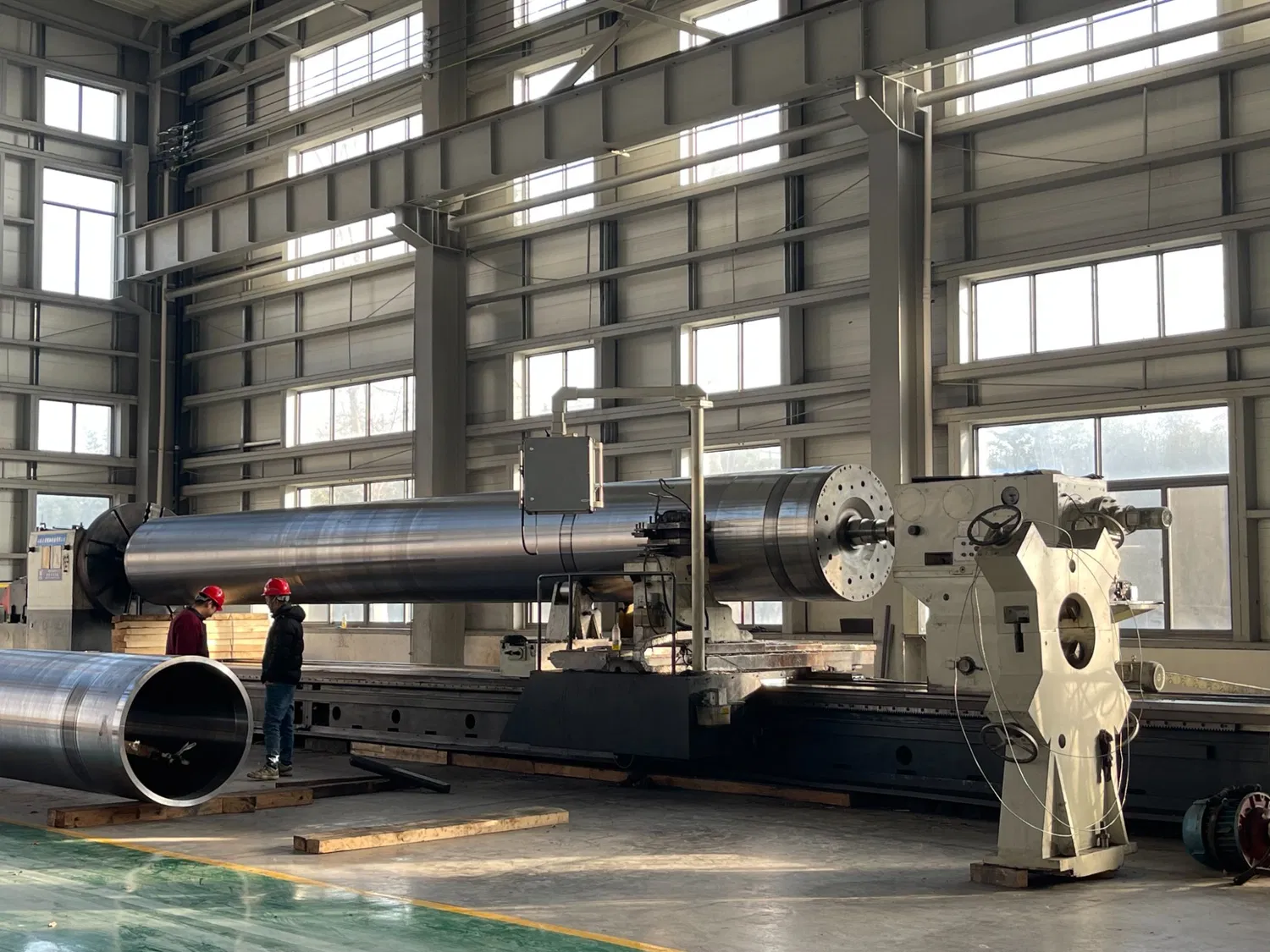Basalt Rolls are quickly gaining recognition as a game-changer in paper calendering. But what exactly makes them such a compelling alternative? Simply put, basalt rolls offer a unique combination of durability, heat resistance, and sustainable sourcing that traditional materials often struggle to match. The paper industry, constantly striving for higher quality and reduced environmental impact, is increasingly turning to basalt as the material of choice for achieving that perfect, smooth finish. From glossy magazines to essential packaging, the quality of paper we interact with every day relies heavily on the calendering process, and basalt rolls are at the forefront of this evolution. We, at our company, have been closely observing and participating in this transition, witnessing firsthand the benefits that basalt brings to the table.
Understanding Paper Calendering
Before we delve deeper into the advantages of basalt rolls, it's crucial to understand what paper calendering entails. Paper calendering is essentially the process of smoothing and compressing paper to achieve a desired thickness, surface finish, and gloss. This is typically accomplished by passing the paper through a series of rollers, often made of materials like chilled cast iron or polymers. The heat and pressure applied during calendering are critical for achieving the desired paper quality. Traditional calendering methods, while effective, can be energy-intensive and may require the use of chemicals. Furthermore, the lifespan of the rollers themselves can be a significant factor in overall operational costs. Enter basalt rolls: a natural alternative poised to address these very challenges. They offer a way to potentially reduce energy consumption and improve the durability of the machinery involved in the paper-making process.
The Allure of Basalt: A Natural Wonder
What makes basalt so special? Basalt is an extrusive volcanic rock, formed from the rapid cooling of lava rich in magnesium and iron. This natural composition lends itself to exceptional strength, high-temperature stability, and chemical resistance. Unlike synthetic materials that require complex manufacturing processes, basalt is readily available and can be processed with relatively less environmental impact. This inherent sustainability factor is a major draw for environmentally conscious paper manufacturers. The raw material is abundant and the process of turning it into usable rolls for calendering significantly reduces reliance on less sustainable alternatives. Think of it this way: instead of manufacturing a material, we're harnessing the power of nature to create a superior product. It is one of the features that sets basalt apart.
Superior Performance of Basalt Rolls
But sustainability alone isn't enough. Basalt rolls truly shine because of their performance. They offer excellent heat transfer properties, allowing for more efficient calendering and potentially reducing energy consumption. Their high wear resistance translates to a longer lifespan, reducing the frequency of replacements and minimizing downtime. The uniform density of basalt ensures consistent pressure distribution across the paper web, resulting in a smoother, more even finish. In comparison to traditional cast iron rolls, basalt offers superior resistance to thermal shock, meaning they are less prone to cracking or warping under extreme temperature fluctuations. This makes them ideally suited for high-speed calendering operations. Frankly, these improvements in performance translate directly into cost savings and enhanced product quality for paper manufacturers.
Basalt Rolls: A Sustainable Choice
Let's talk more about sustainability. Choosing basalt rolls is a conscious decision to minimize environmental footprint. The extraction and processing of basalt rock generally require less energy compared to the manufacturing of synthetic alternatives. Basalt is also a naturally occurring, non-toxic material, eliminating concerns about chemical leaching or harmful emissions. Furthermore, at the end of their lifespan, basalt rolls can be crushed and recycled for use in construction materials, closing the loop on their lifecycle. This circular economy approach is becoming increasingly important in the paper industry, as consumers and regulators demand greater environmental responsibility. You have to wonder, what other industries could benefit from adopting similar sustainable materials?
Applications of Basalt Rolls in Paper Calendering
Basalt rolls are finding applications across a wide range of paper calendering processes, from producing high-gloss coated papers for magazines and brochures to creating smooth, uniform surfaces for packaging materials. They are particularly well-suited for applications where high temperatures and pressures are required, such as in supercalendering and soft-nip calendering. The consistent surface finish achieved with basalt rolls is also highly valued in the production of specialty papers, such as photographic paper and release liners. We've seen our clients successfully implement basalt rolls in various stages of their paper production lines, each tailored to specific needs and applications, and have observed significant improvement in the quality of the final product.
Addressing Common Concerns About Basalt Rolls
Of course, with any new technology, there are often questions and concerns. One common concern revolves around the initial investment cost. While basalt rolls may have a higher upfront cost compared to some traditional materials, their longer lifespan and reduced maintenance requirements often result in a lower total cost of ownership over time. Another concern might be about the availability and supply chain of basalt. However, basalt is an abundant resource, and reputable suppliers have established reliable supply chains to ensure consistent availability. Furthermore, advances in manufacturing techniques are continuously improving the precision and consistency of basalt roll production. Honestly, the perceived risks are often outweighed by the long-term benefits.
Real-World Examples of Basalt Roll Success
To illustrate the tangible benefits of basalt rolls, consider the example of a large paper mill that switched from traditional chilled cast iron rolls to basalt rolls in their supercalendering line. They reported a significant reduction in downtime due to fewer roll replacements, as well as a noticeable improvement in the gloss and smoothness of their coated paper. They also noted a decrease in energy consumption, contributing to their overall sustainability goals. Another example is a packaging manufacturer who implemented basalt rolls in their calendering process for producing food-grade paperboard. They were able to achieve a smoother, more uniform surface finish, enhancing the printability and overall aesthetic appeal of their packaging. These are just a couple of the many success stories highlighting the transformative potential of basalt rolls. According to my experience, this kind of outcome is typical when upgrading.
The Future of Paper Calendering: Basalt Leading the Way
Looking ahead, the future of paper calendering is undoubtedly intertwined with sustainable and high-performance materials like basalt. As the demand for eco-friendly and high-quality paper products continues to grow, basalt rolls are poised to become the industry standard. Ongoing research and development efforts are focused on further optimizing the properties of basalt and refining the manufacturing processes for even greater performance and cost-effectiveness. With increasing pressure on manufacturers to adopt sustainable practices, the appeal of basalt rolls as a natural and effective alternative will only continue to strengthen. Why wouldn’t a company invest in a material that offers both environmental and economic advantages?
Beyond Paper: Exploring Other Applications of Basalt
Interestingly, the unique properties of basalt extend far beyond the realm of paper calendering. Basalt fibers are increasingly being used in composite materials for a wide range of applications, including construction, automotive, and aerospace industries. These fibers offer excellent strength, heat resistance, and corrosion resistance, making them a viable alternative to traditional materials like steel and fiberglass. Basalt rebar is gaining popularity as a sustainable alternative to steel rebar in concrete construction, offering improved durability and resistance to corrosion. The versatility of basalt highlights its potential to revolutionize various industries and contribute to a more sustainable future. Many professionals believe that the possibilities are virtually limitless.
Embracing the Natural Choice: Basalt Rolls for Superior Paper Calendering
In conclusion, Basalt Rolls offer a compelling combination of sustainability, performance, and cost-effectiveness, making them the natural alternative for superior paper calendering. Their unique properties, derived from the earth itself, provide a distinct advantage over traditional materials, allowing paper manufacturers to achieve higher quality, reduce environmental impact, and improve their bottom line. As the paper industry continues to evolve and embrace sustainable practices, basalt rolls are poised to play a central role in shaping the future of paper production. The benefits are clear, the technology is proven, and the future is bright for this natural solution. So, as we've explored, the question isn't really *if* basalt rolls are a good option, but *how* quickly and effectively they can be integrated into existing paper calendering processes to maximize these benefits. We, as a company, remain committed to providing innovative and sustainable solutions to the paper industry, and we believe that basalt rolls are a key component of that vision.



